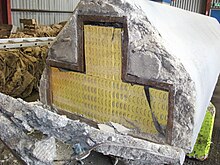This article has multiple issues. Please help improve it or discuss these issues on the talk page. (Learn how and when to remove these messages)
|


The illicit cigarette trade is defined as "the production, import, export, purchase, sale, or possession of tobacco goods which fail to comply with legislation" (FATF 2012).[1] Illicit cigarette trade activities fall under 3 categories:
- Contraband: cigarettes smuggled from abroad without domestic duty paid;
- Counterfeit: cigarettes manufactured without authorization of the trademark holders, with intent to deceive consumers and to avoid paying duty;
- Illicit whites: brands manufactured legitimately in one country, but smuggled and sold in another without duties being paid.
Cigarette smuggling, also informally referred to as "buttlegging", is the illicit transportation of cigarettes or cigars from an administrative division with low taxation to a division with high taxation for sale and consumption. The practice, commonly used by the tobacco industry,[2][3] organized crime syndicates and rebel groups, is a form of tax evasion.[4] Interstate 95, a highway traversing the East Coast of the United States, came to be known informally as "New Tobacco Road"[citation needed] when it became a favorite cigarette-smuggling route. Illicit cigarette trade is usually a crime.
- ^ Cite error: The named reference
(FATF 2012)was invoked but never defined (see the help page). - ^ "Tobacco Smuggling", TobaccoTactics website by the Tobacco Control Research Group of the University of Bath (retrieved on 24 June 2021).
- ^ A. B. Gilmore, A. W. A. Gallagher and A. Rowell, "Tobacco industry's elaborate attempts to control a global track and trace system and fundamentally undermine the Illicit Trade Protocol", Tobacco Control, volume 28, pages 127-140, 2019.
- ^ Bruce Bartlett (2002). "Cigarette Smuggling". National Center for Policy Analysis. Archived from the original on 23 January 2008. Retrieved 30 December 2007.